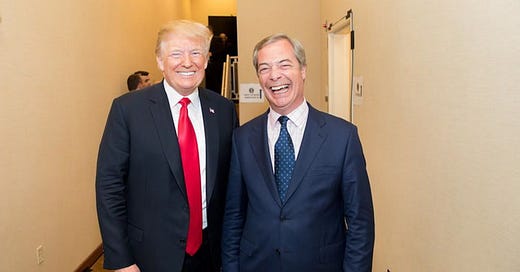Some thoughts on two elections... and two realities
So the UK General Election took place less than a month ago, and predictably Sir Keir ‘Trilateral Commission’ Starmer became Prime Minister at the head of a Labour government.
Less predictably, I voted. In my previous post Scamdemic I had said that I strongly suspected that my 2019 vote for Boris Johnson would be my last ever, and indeed even when the election was called by a rain-soaked Rishi Sunak I had been 99% certain that I would not be participating.
My vote went to Reform UK, led by Nigel Farage, who made a late stage comeback as party leader during the election campaign. Why did I vote - was it just a protest against an inevitable result? Perhaps. It did somehow feel necessary in the end to make some kind of stand against the clearly appalling incoming government and the equally appalling outgoing one. Or did I just fall victim to another psyop perpetrated by ‘controlled opposition’ and participate in a piece of theatre?
Certainly Farage and Reform said all the right things to appeal to a certain demographic. Their ‘manifesto’ even mentioned rejection of the WEF and WHO, and called for an investigation into Covid vaccine deaths. Farage’s calling out of NATO’s role in the Ukraine conflict, portrayed as a huge gaffe by the mainstream media, certainly would have done him little harm amongst those sceptical of their government’s intentions. It would have been churlish not to vote for them, and indeed I am aware of other Covid-sceptics that I encountered during the height of the madness who also cast their vote for Reform.
Was it all just a bit too convenient and scripted though? Farage’s sudden return to the fold, and the huge collapse in the Conservative vote gifted Labour a massive majority, despite receiving less votes than they did under the much-derided leadership of Jeremy Corbyn. Was Reform’s role to split the vote, or to act as a place of containment for disgruntled sovereigntist voters? If Reform hadn’t been in the mix would Labour’s majority have been much smaller - or would those voters simply have stayed at home? I suspect the latter, but who knows.
That’s just it though isn’t it? Who knows? Certainly the so-called ‘truth movement’, briefly united during Covid, is so divided over so much e.g. Israel, Putin, Trump, Elon Musk… that it can’t be relied upon as a unified source of veracity. I find myself simply not knowing what to think much of the time, having to keep two potential realities in mind at all times.
This is even more pertinent when it comes to the US election. At the time of writing, this particular soap opera has reached new heights when it comes to bizarre plot turns. First, the assassination attempt on Trump. I must admit when I first heard about it and then saw that photo it did cross my mind that the event was staged - it was just too heroic, too perfect. Then, rejecting that notion, the questions became more about whether the Secret Service had deliberately set Trump up to be slain. It seemed like Trump was unbeatable, but a week later Biden was out of the race, endorsing the gormless Kamala Harris as his chosen heir. Now, Harris is the one with the momentum, transformed by the mainstream media from buffoon to ‘brat’ (whatever that might be!) in days, if not hours. Of course all the polls are extremely close, setting things up for a thrilling final run into November - although no doubt there will be more twists to come.
Again - what to think? Does the result even matter? Is it all just the theatrical performance that it often appears to be? Like Farage, his junior equivalent, Trump says all the right things on 90% of issues, and Harris says all the wrong things on 100% of the issues, so in a sense the choice is clear. However, it is impossible to forget who was occupying the Oval Office in 2020 when the scamdemic began, and who initiated ‘Operation Warp Speed’.
I can’t deny recent weeks have rekindled my interest in electoral politics, though I keep reminding myself not to take it all too seriously, or to be too trusting of any party or individual. What’s a conspiracy? What’s real? Are conspiracy theories themselves put out there to confuse us and keep us arguing and distracted? Before Covid I was a firm believer in the ‘cock-up’ view of history and politics and rejected anything approaching a conspiracy theory, afterwards I was close to the other extreme, examining - if not actually accepting - ideas about flat earth and fake space. Now, after another two years of normality/insanity, I’m in a liminal space, straddling those two realities I mentioned above, not sure whether to fully reject or fully accept anything I see or hear. I suspect I’m not the only one.




